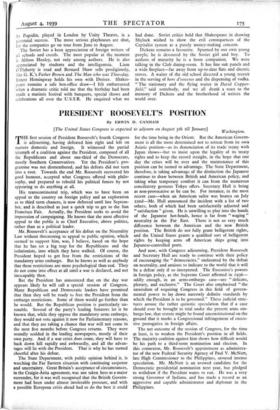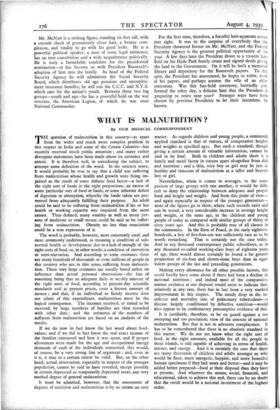PRESIDENT ROOSEVELT'S POSITION
By ERWIN D. CANHAM
[The United States Congress is expected to adjourn on August 5th till January] Washington.
THE first session of President Roosevelt's fourth Congress is adjourning, having defeated him right and left on matters domestic and foreign. It witnessed the partial triumph of a coalition against the President, composed of all the Republicans and about one-third of the Democrats, mostly Southern Conservatives. Yet the .President's pro- gramme was not dismembered, and his defeats did not turn into a rout. Towards the end Mr. Roosevelt recovered his good humour, accepted what Congress offered with philo- sophy, and prepared to rebuild his political fences by not appearing to do anything at all.
His transcontinental trip, which was to have been . an appeal to the country on foreign policy and an exploration as to third term chances, is now deferred until late Septem- ber, and is described as just a quick trip to get to the San Francisco Fair. Actually, the President seeks to avoid the impression of campaigning. He knows that the most effective appeal to the public is as Chief Executive, above politics, rather than as a political leader.
Mr. Roosevelt's acceptance of his defeat on the Neutrality Law without threatening to appeal to public opinion, which seemed to support him, was, I believe, based on the hope that he has set a big trap for the Republicans and the isolationists, into which they have walked. Of course, the President hoped to get free from the restrictions of the mandatory arms embargo. But he knows as well as anybody that these restrictions are more psychological than real. They do not come into effect at all until a war is declared, and not inescapably then.
But the President has announced that on the day war appears likely he will call a special session of Congress. Many Republican and Democratic leaders have promised that then they will be ready to free the President from the embargo restrictions. Some of them would go further than he would. But the Republican position is particularly un- tenable. Several of the party's leading Senators let it be known that, while they oppose the mandatory arms embargo, they would not vote against it now for Parliamentary reasons, and that they are taking a chance that war will not come in the next five months before Congress returns. They were soundly scolded in the leading newspapers, mostly of their own party. And if a war crisis does come, they will have to back down hill rapidly and awkwardly, and all the advan- tages will lie with the President. That is why he has turned cheerful after his defeat.
The State Department, with public opinion behind it, is watching the Far Eastern situation with continuing suspense and uncertainty. Great Britain's acceptance of circumstances, in the Craigie-Arita agreement, was not taken here as a major surrender, for it was well recognised that the British Govern- ment had been under almost intolerable pressure, and with a possible European crisis ahead had to do the best it could for the time being in the Orient. But the American Govern- ment is all the more determined not to retreat from its own Asiatic position—as its denunciation of its trade treaty with Japan shows—but to insist upon the legality of its treaty rights and to keep the record straight, in the hope that one day the crises will be over and the maintenance of this position can be turned to advantage. The State Department, therefore, is taking advantage of the distinction the Japanese continue to draw between British and American policy, and taking what temporary comfort it can from the numerous conciliatory gestures Tokyo offers. Secretary Hull is being as non-provocative as he can be. For instance, in the most recent case—when an American sailor was beaten on July 22nd—Mr. Hull announced the incident with a list of two others, both of which had been satisfactorily adjusted and " satisfaction " given. He is unwilling to play into the hands of the Japanese hot-heads, hence is far from " waging " neutrality in the Far East. There is not so very much difference between the American and the new British position. The British do not fully grant belligerent rights, and the United States grants a qualified sort of belligerent rights by keeping arms off American ships going into Japanese-controlled ports.
And now, with Congress adjourning, President Roosevelt and Secretary Hull are ready to continue with their policy of encouraging the " democracies," undaunted by the defeat on neutrality, and anxious to indicate to the world that it will be a defeat only if so interpreted. The Executive's powers in foreign policy, as the Supreme Court affirmed in r936— oddly enough, in an arms-embargo case—are " delicate, plenary, and exclusive." The Court also emphasised " the unwisdom of requiring Congress in this field of govern- mental power to lay down narrowly definite standards by which the President is to be governed." These judicial stric- tures arouse the rather quixotic speculation that if a case should ever be brought to trial under the present arms em- bargo law, that statute might be found unconstitutional on the ground that it marks a Congressional infringement of execu- tive prerogative in foreign affairs.
The net outcome of the session of Congress, for the time at least, is to weaken the President's position in all fields. The majority coalition against him shows how difficult would be his path to a third-term nomination and election. In this connexion, Mr. Roosevelt's appointment as administra- tor of the new Federal Security Agency of Paul V. McNutt, late High Commissioner to the Philippines, aroused intense speculation. Mr. McNutt is an avowed candidate for the Democratic presidential nomination next year, but pledged to withdraw if the President wants to run. He was a very strong Governor of Indiana, and has made a record as an aggressive and capable administrator and diplomat in the Philippines. Mr. McNutt is a striking figure, standing six feet tall, with a smooth shock of prematurely silver hair, a bronze com- plexion, and vitality to go with his good looks. He is a powerful political speaker, a man of some legal eminence, has an iron constitution and a wide acquaintance politically. He is truly a formidable candidate for the presidential nomination—or has become so with President Roosevelt's adoption of him into the family. As head of the Federal Security Agency he will administer the Social Security Board, which distributes old age pensions and unemploy- ment insurance benefits; he will run the C.C.C. and N.Y.A. which care for the nation's youth. Between these two big groups—youth and age—he has a powerful hold on the war veterans, the American Legion, of which he was once National Commander. For the first time, therefore, a forceful heir-apparent comes into sight. It was to the surprise of everybody that the President showered favour on Mr. McNutt, and the Federal Security Agency is the greatest political opportunity of the year. A few days later the President drove to a i2-acre hay- field on his Hyde Park family estate and signed deeds giving the land to the Government. On it will be built a memorial library and depository for the Roosevelt papers. To this spot, the President has announced, he hopes to retire, work at his papers, and perhaps assume the role of an elder statesman. Was this hay-field ceremony, hurriedly per- formed the other day, a delicate hint that the President is preparing to retire next year? Stranger ways have been chosen by previous Presidents to let their intentions be known.









































 Previous page
Previous page